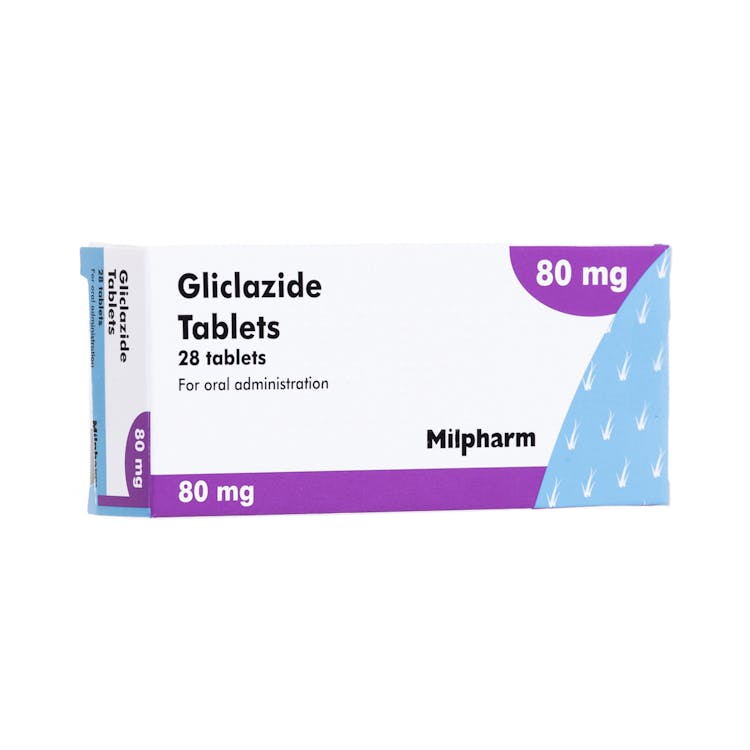- Home
- Chronic Conditions
- Diabetes Treatment
- Gliclazide
Gliclazide
Bilder endast för illustrativa ändamål
Gliclazide is a tablet medication used to help control blood sugar levels in people who have been diagnosed with type 2 diabetes. It works by increasing the amount of insulin the pancreas makes, which in turn lowers blood sugar levels. Taking Gliclazide can lead to low blood sugar levels and hypos, so it is important that you recognise the symptoms of this including feeling shaky, anxious, sweaty, or dizzy.
- Treats type 2 diabetes
- Lowers blood sugar
- Increases the amount of insulin your body produces
- Genuine medication
- Shipped from EU Pharmacies
Mer information
About Gliclazide
- Gliclazide is prescribed for diabetes when dietary and lifestyle changes alone have not lowered blood sugar levels
- Gliclazide works by helping the body produce more insulin to lower blood sugar levels
- Gliclazide should be taken in combination with lifestyle and dietary modifications for the best clinical outcome
- Gliclazide is sometimes known by its brand name Bilxona
- Gliclazide is sometimes prescribed alongside other anti-diabetes medications
- It is important to read the patient leaflet for a full list of side effects and cautions.
What is Diabetes?
Our bodies rely on insulin which is made by the pancreas. Insulin helps to control the amount of glucose (sugar) in the blood. If the body starts to make less insulin, our blood sugar levels are left to rise unchecked. In some people, the body has also stopped responding properly to any insulin that is being produced. The rising blood sugar levels will lead to diabetes.
High levels of glucose in the blood over a prolonged period can cause damage to the blood vessels, nerves, kidneys, and eyes. Some patients will eventually require amputation of extremities including the toes or feet. It is therefore very important to keep your blood glucose levels under control, even if you currently feel well.
How Does Gliclazide Work?
Gliclazide increases the amount of insulin the pancreas produces. As insulin acts to bring down blood glucose levels, this helps to keep your blood glucose level within the normal range. However, there is a risk that gliclazide can cause blood glucose levels to fall too low, and so you must be aware of the risk of hypos (hypoglycaemia or low blood sugar).
How is Gliclazide Taken?
Gliclazide is a tablet that should be swallowed with some water. It can be taken with or without food.
Dosage of Gliclazide
It is important to take gliclazide exactly as it has been prescribed for you. Gliclazide is usually taken once or twice a day.
The dose can range from 40mg once a day, up to a maximum of 160mg twice daily.
The starting dose is likely to be lower for the elderly, or those at risk of hypoglycaemia (low blood sugar).
Are there any Side Effects?
Like all medications, gliclazide can have some side effects. The most common side effects include:
- Having a hypo (see below under Warnings)
- Abdominal pain
- Nausea or vomiting (feeling sick or being sick)
- Diarrhoea
- Constipation.
The digestive side effects are likely to settle down, and may be alleviated by taking gliclazide with your breakfast. If they persist or become troublesome you should speak to your doctor for further advice.
Serious allergic reactions happen very rarely. If you have a severe allergic reaction (anaphylaxis) including breathlessness, lip swelling or tongue swelling, call 999 immediately.
Gliclazide Warnings
When taking gliclazide, you should be aware of the early signs of low blood sugar. These include:
- Feeling hungry
- Trembling or shaking
- Struggling to concentrate or feeling confused
- Sweating.
If a hypo occurs, you should eat or drink a fast acting carbohydrate such as sugary fruit juice, sweets or a sugar cube. If you still feel unwell, seek immediate medical advice.
Gliclazide may not be suitable for everyone. You should tell your prescriber if you:
- Have type 1 diabetes
- Have severe liver or kidney disease
- Are being treated with miconazole
- Have alcohol dependence or regularly drink large quantities of alcohol
- Are pregnant, trying to conceive, or breastfeeding.
Some medications can interact with gliclazide. You may be advised that gliclazide will not suit you if you already take:
- Oral (by mouth) miconazole
- Phenylbutazone
- Other anti-diabetic medications
- Medications for heart disease
- Antidepressants
- Medications for heartburn or reflux
- Certain antibiotics
- Pain relief including NSAIDs such as ibuprofen or diclofenac.
Because gliclazide may not suit everyone, we will complete a Consultation with you including a health questionnaire. This will ensure that the medication will be suitable for you.
A qualified prescriber will review your current medications, including any herbal remedies or supplements, to ensure that gliclazide will not interact with them.
Once prescribed, gliclazide will be ordered on your behalf via electronic prescription. Gliclazide will then be conveniently dispatched from one of our partner pharmacies.
Buy Gliclazide
Buying Gliclazide Online
Can I buy Gliclazide online?
You can safely buy Gliclazide online at EU Meds. You will first need to have an online consultation with a pharmacist independent prescriber before your order will be supplied. The online consultation will ensure that Gliclazide is the right medication for your medical condition.
Do I need a prescription for Gliclazide?
Yes, in order to purchase Gliclazide you will need a valid prescription. Please note, all requests for supply of prescription medications are subject to an online clinical consultation and the decision to prescribe will be made by a doctor.

Här för att hjälpa dig
Our Customer Service is available Monday to Friday 9am - 4pm. If you need urgent assistance, do not use this service. Call 111, or in an emergency call 999. Visit our help section



